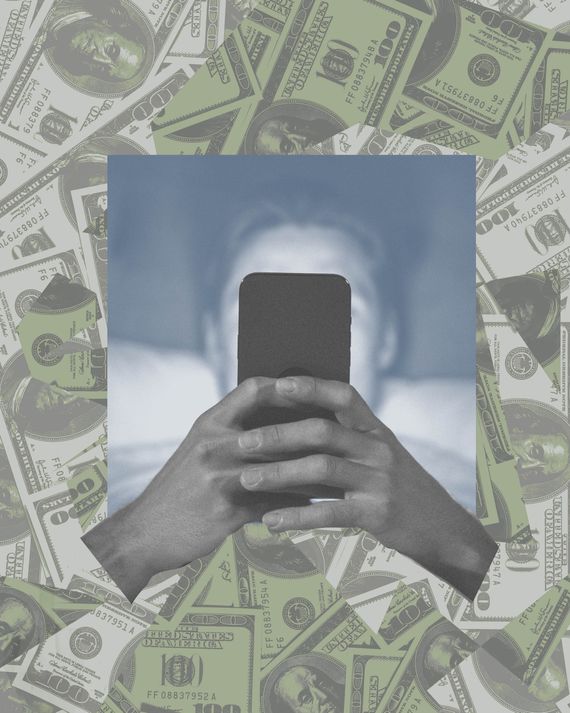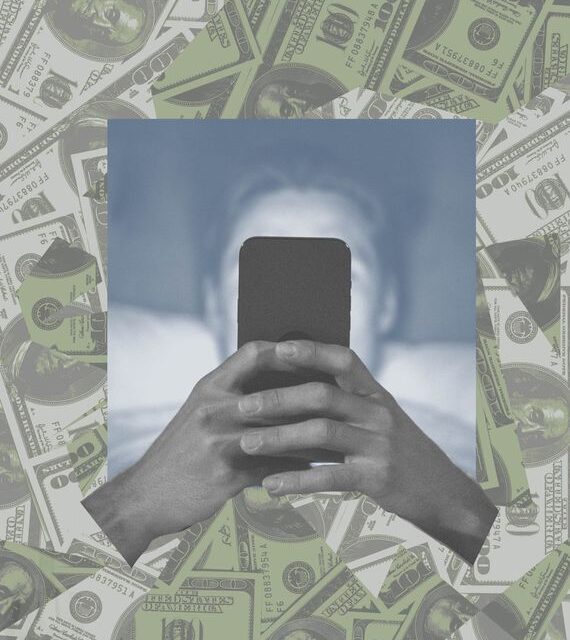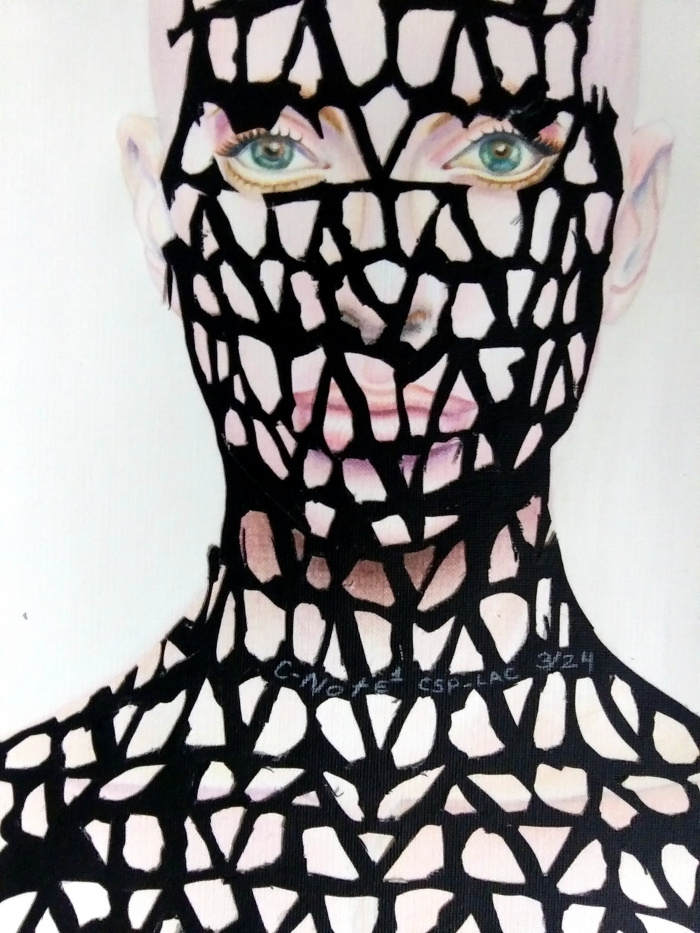
Evelyn knew something was off. Her usually calm boyfriend of four years had become more irritable, slamming kitchen drawers if he couldn’t find what he was looking for and punching the dashboard of his car if he hit a red light. He’d also stopped wanting to have sex. She grew suspicious over how protective he’d become of his phone. “It was glued to him,” says Evelyn, who is 27. “He slept with it under his pillow.”
After months of unnerving behavior, Evelyn managed to get ahold of his device. She discovered a secret Instagram account where he followed 300 women, all of whom posted sexual photos and videos. Shortly after that, Evelyn found messages he had sent, including to one particular model he’d corresponded with. The woman’s screen name was the same as the alias she used on OnlyFans, which she’d searched hoping for some kind of clue. “That was the first thing that gave me a window into all of it,” says Evelyn (whose name, like most others in this story, has been changed for privacy).
Her boyfriend insisted nothing was wrong, but Evelyn was desperate for answers. She contacted the OnlyFans model, who confirmed Evelyn’s boyfriend was among her regular subscribers.
It turned out her boyfriend was addicted to OnlyFans. He subscribed to around 40 women’s accounts and spent hundreds a month, plus tips of around $150 in exchange for videos made just for him. Evelyn has no issue with pornography; it’s the messages that felt like betrayal. She found one he’d sent while grocery shopping. “I just wanted to say hi,” he had written. “I’m in the Costco bathroom and my girlfriend is waiting outside for me.” To another woman, he’d send frequent compliments, and he even messaged her to say “Merry Christmas” during the holidays.
According to sex therapists, OnlyFans addiction — when compulsive purchases on interactive sex sites spiral out of control — has become worryingly common. Though it has similarities to characteristics of porn, sex, gambling, and shopping addictions, the unique factor seems to be that OnlyFans, and similar sites such as Chaturbate, provide parasocial fantasy. Subscribers like Evelyn’s boyfriend pay not only for pleasure but for companionship, or for the comforting illusion of it. “People certainly feel in love with the women they’re interacting with,” says Nancy Tricamo, a psychotherapist in New York City and the clinical director at the Center for Intimacy Recovery. “It becomes a relationship in their mind.”
Porn addiction has been researched and treated for decades, and studies have repeatedly shown that some men struggle to reduce their porn consumption even when they want to. But with OnlyFans, which launched in 2016 and has surged in popularity since COVID lockdowns, people subscribe to specific creators and can request custom content, which can make users more attached. Part of the allure is that users believe they’re communicating directly with the attractive woman on their screen, beholding material created just for them. (Sometimes they are, and sometimes they’re sexting a hired copywriter.) By design, OnlyFans, unlike porn, runs on the mirage of intimacy. For many, it’s an enjoyable form of connection with no strings attached. For others, it becomes a costly obsession that’s not easily fixed.
Eric has always had a hard time connecting with people in person. He’s had gym memberships, volunteered, and joined clubs. He’s gone to bars. He’s gone to therapy. He hasn’t had sex in years and says he wouldn’t know where to begin finding sex workers to hire. Eric, who’s 30, first discovered OnlyFans while looking for photos and videos of women but became “undone” by its messaging feature, which allowed him to speak directly to women he was attracted to. “I had a very rough couple of years and was unimaginably lonely,” he says. “Being able to talk to another person was like pure heroin.”
The sexual content was gratifying, but much of the $10,000 he’s spent on OnlyFans went to Girlfriend Experiences, a feature that allows subscribers to engage in casual ongoing conversation that’s not about sex, similar to a text chat between friends or couples. Eric spent an additional $300 to $600 per month “just to have someone pretend to care about my day and say good morning.”
“I checked on it all the time,” he says. “In the morning, during breaks at work, in the afternoon, before bed, when I got up to pee in the night.” If the models he’d paid for Girlfriend Experiences weren’t quick enough in their responses, he’d add to his roster and hire more women to sext him. “I spent thousands on it. Enough that I feel a visceral horrible feeling in my gut. I could have bought an Omega Seamaster,” he says, referring to the high-end watch brand worn by James Bond.
After calculating what he’d spent, Eric realized he had a problem. He’s now cut down on OnlyFans and tries to use it only occasionally. He always understood the dynamic to be transactional, but that didn’t stop his interest, he says. Dating apps “shattered” his mental health, but on OnlyFans, there was no rejection to contend with. “I could fail all day at trying to make small talk with co-workers and on dating apps and then just go to OnlyFans,” he says, describing the platform as “pay to win.” As long as he had money, he’d have company, even if not entirely authentic, even if through a smartphone screen.
While Eric has tried to meet people in person, Matthew, a shy 22-year-old, is too intimidated by vulnerability and possible rejection. He explains being stuck in a cycle of addiction to Chaturbate, which ends up perpetuating his fear of seeking out genuine relationships.
Over a year and a half, he spent $14,000, while attempting on and off to stop — he’s deleted and rebooted his accounts numerous times, blocked and unblocked sites on his phone, and added a parent to his bank account to monitor spending. (His parent ended up not watching the account closely, so he continued to spend.) He even went so far as to give his password to a friend, hoping the barrier to access would end his use altogether. He managed to persevere for 18 days, then struck a deal with himself: he can look at porn, but he can’t pay for interaction on Chaturbate.
Matthew first subscribed to sex sites right after high school, when he started earning money. His heaviest spending tends to coincide with episodes of depression. “I didn’t see much of a future for myself, so I didn’t care what I spent. When I was done with that phase, I was like, Damn, I really spent all that money and now I’m screwed,” he says. He would make purchases, feel bad the next day, then do it again. “It took over my life,” he says. “I didn’t feel like I had any control.”
Paying for parasocial engagement saved Matthew from having to put himself out there. It’s funny, he says, how highly sexual he is online compared to how timid he is toward women in real life. “It made me give up on meeting someone,” he says of Chaturbate. “It was a safe place where I could get the same result, or so I thought, and not have to put in all that work.” He’d like to progress toward replacing time spent on sex sites with activities like exercise and cooking. For now, he’s watching a lot of Netflix and playing video games, which are enjoyable without tempting him toward behavior he wants to resist.
Australian sex addiction therapist Tori McCarthy says she’s seeing more young people develop dependencies to online sex platforms. “They end up not knowing how to be in a relationship,” she says. “They rely so heavily on these relationships with people who aren’t real.”
When clients began seeking help with OnlyFans fixation — the torrent came shortly after the platform’s boom during COVID lockdowns — McCarthy turned to sex-addiction framework to provide treatment. But while the broad category of sex addiction has long been understood as having roots in trauma, treatment of contemporary sex addiction, including to OnlyFans, often connects to loneliness, which has caused the category to expand. People who become addicted to parasocial companionship aren’t necessarily chasing dopamine. Sometimes what they crave is affection. “Technology in general has blown up addiction,” McCarthy says. Because isolation can be as painful as trauma, it can be what drives the dependency. McCarthy has seen people who, after blocking sex platforms from their devices, bought new computers to get around their quitting attempts. “The thing that will lead them back is loneliness,” she says.
Plenty of people enjoy online sex services without it harming their lives. “Then there will be people who have the genetic makeup for addiction, or something about who they are, that creates a compulsive experience that’s hard to let go of, which builds and becomes worse,” says Tricamo. “Usually rock bottom is when they’re out of money” — she’s worked with clients who’ve spent hundreds of thousands — “or their partner finds out.”
This form of addiction is not limited to the single and lonely or to young men. Julianne’s family’s rock bottom occurred when she discovered her husband had spent at least $46,000 on a woman online — who was close in age to their daughters — on content that wasn’t particularly sexual. “We were the couple that everybody wanted to be,” says Julianne, a 51-year-old from Minneapolis. “He was the husband that everybody wanted. I constantly got asked if he had any siblings or cousins.” Julianne knew her husband looked at porn, and though their bedroom life was lackluster, it never made for an unhappy home. When they drove in the car, they’d hold hands over the center console. When he came to bed late at night, after working a remote job headquartered in another time zone, he’d give her a kiss before falling asleep. Seemingly all of a sudden, his affection came to a halt. He told Julianne he wanted a divorce.
In shock, she searched his laptop, where she discovered fake email addresses and messages between her husband and the woman he paid to talk to him. Their financial challenges now made sense; the couple had been living paycheck to paycheck despite both having decent jobs. “We never had money to do renovations around the house that needed to be done. We never had money to go on vacation,” she says. “And I never understood why.”
Among many messages, Julianne found one that read “Good morning beautiful.” “That killed me,” she says. “He never said anything like that to me.”
She confronted him, but he was in denial. “He thought that they were friends and that she liked him just as much as he liked her,” says Julianne. “I said, ‘You don’t have to pay your friends to interact with you.’”
In a bid to keep their family together, Julianne’s husband made significant changes. He deleted his accounts; went to Sex Addicts Anonymous meetings, which encouraged him to disclose his addiction to family and friends; and rearranged his office so that his computer screen faces the door as a gesture of transparency.
When Evelyn discovered her boyfriend’s addiction, the pain and frustration she felt was directed squarely at him — she didn’t blame the OnlyFans models, and she said the woman she reached out to responded to her message and eventually blocked her boyfriend even though it meant losing income. Julianne feels differently toward the woman her husband fixated on. “There are other ways to make money. You’re taking advantage of vulnerable people and destroying families. You’re destroying relationships. She knew what she was doing,” she says. In the aftermath of discovering her husband’s addiction, Julianne came across a Reddit account she believes belonged to the woman he’d sent so much of their money to. “She was bragging about how doing cam work helped her buy a house. I hope her house burns to the ground.”
Laura has a background in mental health, specializing in services for the homeless, and earns additional income through OnlyFans. She posts sexual content of herself and sometimes with her husband, but about 80 percent of her OnlyFans work consists of texting about politics or football. “There’s a lot of lonely men out there,” she says. “They want to look at pictures of me, but they also want to have conversations that for whatever reason they’re not getting to have in their day-to-day lives.” She’s had a few customers engage with her frequently, and generously, then suddenly disappear, perhaps because they panicked about how much money they spent, perhaps because they were caught by their partner, perhaps because they’re stuck in a cycle of addiction they’re trying to break out of — there’s no way for her to know, but she does find herself wondering if they’re okay.
Sometimes clients confide in her about personal issues, including married men who want to talk about their own relationships. “It’s really hard,” she says. “I’m not in this role as a therapist … I have a few guys who clearly develop an emotional attachment to me, but this is money I’m saving for my kids’ college funds. It’s not necessarily my responsibility to emotionally manage clients or be concerned with guys who are catching feelings.”
“I will say,” she adds, “that if I had a situation where a man was spending thousands of dollars on me, that would raise some red flags, and I would probably put the kibosh on that.”
When I first spoke to Evelyn, she was hurt by her boyfriend’s OnlyFans use and concerned about his rising irritability, which she now knows can be a symptom of addiction. But he assured her he’d deleted his account, his mood improved, and they started having sex again. She looked ahead to a future that might include marriage and children. A few months later, Evelyn wrote to me with an update. “I discovered that there’s been a relapse with my partner and he’s been communicating with girls on Fansly and NSFW Reddit again, for the past four months,” she told me. Her boyfriend hadn’t actually changed his behavior. He’d simply moved it to different platforms.
Relapse is common with this form of addiction. Healing is possible, but not easy. “It can be incredibly painful,” says Tricamo. “It’s like getting sober from anything.”
This time around, Evelyn pried through her boyfriend’s phone because she noticed his temper had returned; he’d raise his voice if she asked about his day. Among the conversations she found was a thread with a model he’d been in touch with for two years — half their relationship. At first, her boyfriend claimed he’d been set up by an ex-girlfriend. She’d created a fake account, he said, insisting the conversations weren’t his. When he finally admitted it, he broke down and cried.
What Would You Do If Your Husband Spent $46,000 on OnlyFans?
This post was originally published on this site be sure to check out more of their content.







Leave a Comment